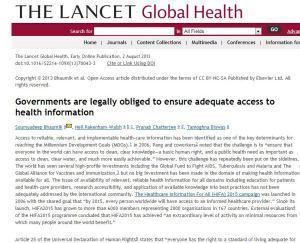The Lancet Global Health published a paper yesterday titled , ” Governments are legally obliged to ensure adequate access to health information ” that calls to increase the availability and use of healthcare information in low- and middle-income countries globally and recognition of access to health information as a legal right of citizen The paper has been written by Dr. Soumyadeep Bhaumik, HIFA Country Representatives for India together with his colleagues Pranab Chatterjee, and Tamoghna Biswas along with Dr Neil Pakenham Walsh , coordinator of HIFA2015 and CHILD2015 networks and codirector of Global Healthcare Information Network.
Governments are legally obliged to ensure adequate access to health information
Access to reliable, relevant, and implementable health-care information has been identified as one of the key determinants for reaching the Millennium Development Goals (MDGs).1 In 2006, Pang and coworkers2 noted that the challenge is to “ensure that everyone in the world can have access to clean, clear knowledge—a basic human right, and a public health need as important as access to clean, clear water, and much more easily achievable.” However, this challenge has repeatedly been put on the sidelines. The world has seen several high-profile investments including the Global Fund to Fight AIDS, Tuberculosis and Malaria and The Global Alliance for Vaccines and Immunization,3 but no big investment has been made in the domain of making health information available for all. The issue of availability of relevant, reliable health information for all domains including education for patients and health-care providers, research accessibility, and application of available knowledge into best practices has not been adequately addressed by the international community. The Healthcare Information For All (HIFA) 2015 campaign was launched in 2006 with the shared goal that “by 2015, every person worldwide will have access to an informed healthcare provider.” Since its launch, HIFA2015 has grown to more than 6000 members representing 2000 organisations in 167 countries. External evaluation4of the HIFA2015 programme concluded that HIFA2015 has achieved “an extraordinary level of activity on minimal resources from which many people around the world benefit.”
Article 25 of the Universal Declaration of Human Rights5 states that “everyone has the right to a standard of living adequate for the health and well-being of himself and of his family, including food, clothing, housing and medical care and necessary social services, and the right to security in the event of unemployment, sickness, disability, widowhood, old age or other lack of livelihood in circumstances beyond his control.” So then, when a child dies of pneumonia because eight in ten caregivers in developing nations are unaware of the key symptoms,6 are we guaranteeing any “standard of living adequate for health?” …..
Click on the Snapshot of the paper to read full paper. (Open Access )


